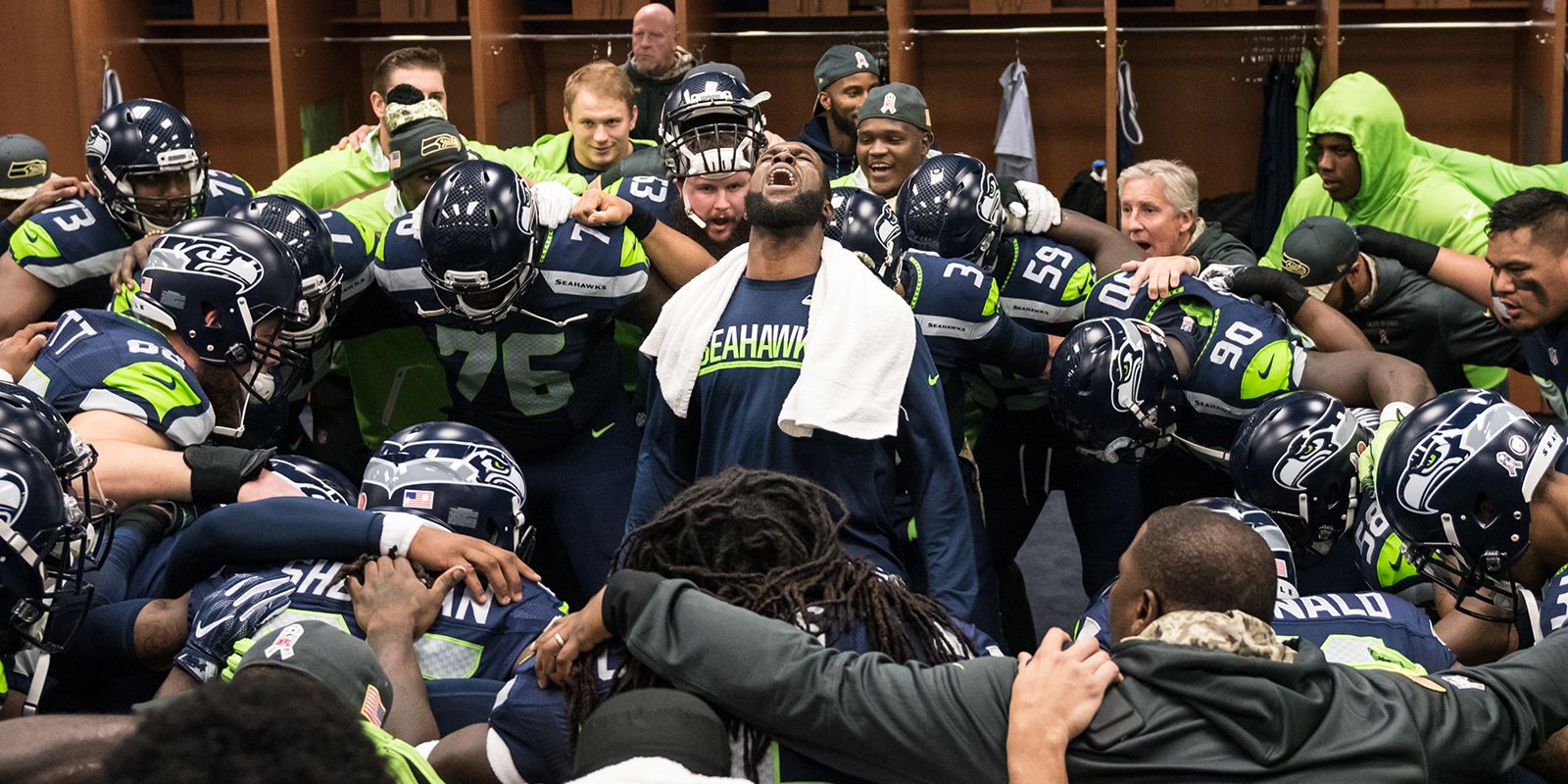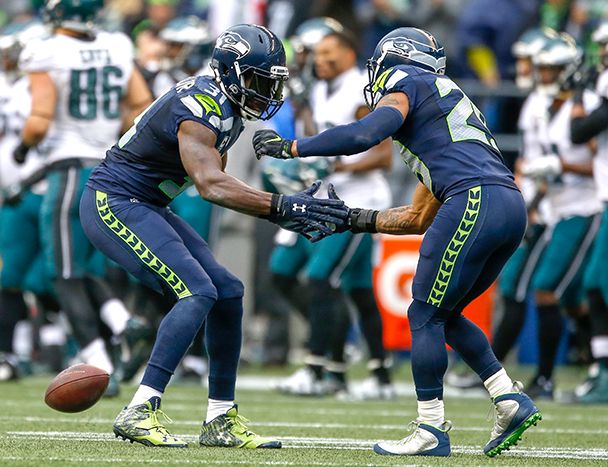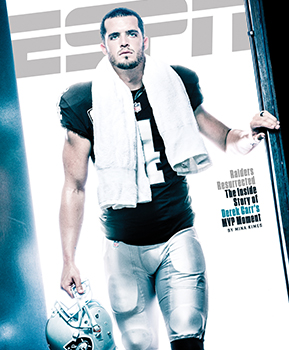
Leading The Boom
Whenever the Seahawks need a charge, Kam Chancellor steps up to deliver. This is the story of how the once-reticent safety found his voice -- and then nearly lost it.
It is still two hours before a game in which Kam Chancellor is too hurt to play, but already the Seahawks safety has sweated through his T-shirt and begun to lose his voice. "Get after it. Come on now. Let's go!" he says, shouting motivation at his teammates during the quiet of a pregame stretching drill. His rasps echo in the empty stadium, too loud to ignore, and after a while coach Pete Carroll walks over to join him.
Carroll selected Chancellor in his first draft as Seahawks coach in 2010, and in the seven seasons since, Carroll and others have come to refer to Chancellor as the team's soul. Russell Wilson might be the Seahawks' public face. Richard Sherman might be their most bombastic voice. But on a team that is uniquely built around the fragile chemistry of locker room relationships, Chancellor remains the foundation upon which everything else is built. "When he's good, we're all good, because he's the guy who has everyone's respect," Sherman says.
It is Chancellor whom teammates credit for uniting the locker room on the way to back-to-back Super Bowl appearances. It is Chancellor who now blames himself for disrupting that chemistry last season with his two-game contract holdout, a situation that he says damaged relationships with teammates and compelled him to apologize.
And now, on this Monday night, it is Chancellor who Carroll believes is most capable of igniting the Seahawks for the season's stretch run -- even if he's still hobbled on the sideline in street clothes, about to miss his fourth consecutive game with a groin injury.
"You should speak to the guys before the game tonight," Chancellor would later recall Carroll telling him.
Why? I'm not even playing, Chancellor thought to himself.
Before he can say anything, though, Carroll says: "Doesn't matter. They want to hear you anyway."
For most of his life, Chancellor avoided these pregame speeches. Even as team captain in high school, in college and during his first years in the NFL, he never once spoke in front of an entire team. There was an entire locker room ready to follow him before he was ever ready to lead. He was considered one of the most intense, fearless players in the NFL before he was brave enough to talk in front of a group.
But now, in the moments before a Monday night game against Buffalo, he approaches the team huddle in the center of the locker room. He walks past Carroll and the other coaches who always stand on the outer ring, and then past Wilson and Sherman until he reaches the middle of the circle. One player speaks before each Seahawks game, a rotating core of four or five superstars, but teammates say that Chancellor's speeches feel most akin to a religious chant. He closes his eyes. His muscles tense up. He opens his eyes and looks possessed, demanding eye contact with every player on the team.
"It's a blur of adrenaline," Chancellor will later explain. "I get this crazy look on my face, and you never feel more connected to everyone in that room. It's almost spiritual for me. I think up one or two words or phrases, and then I just go."
This time, the concept he comes up with is about the importance of momentum for a Seahawks team that has managed to remain one of the NFC's best without reaching its full potential. He starts speaking, and pretty soon he is slapping his chest, spit flying everywhere as he spins in a circle so everyone can see him. He's talking about how to begin a postseason run and how one good play can lead to the next, but he might as well be describing his own role on the team.
"One match is a fire starter," he says, and then he is chanting it. "One match. One match. One match! It only takes one to light up the whole box."

Teammates credit Chancellor for uniting the locker room before consecutive Super Bowl appearances. Photo by Otto Greule Jr/Getty Images
His voice is still gravelly and sore from that speech a night later when he walks into a Seattle-area restaurant and orders tea. He's out for the night with his fiancée, Tiffany Luce, and for the past 24 hours they have been celebrating a surreal run of good news. First, Chancellor's speech helped inspire a win over the Bills, and then, after the game, Seahawks doctors medically cleared him to begin practicing again with the team. After that, he took Luce out to dinner at the restaurant where they first met, the place he decided to propose. Now she can't stop staring at the brand-new diamond on her hand, and neither can he.
"This is really happening?" she says.
"This is happening," he says. "It's like everything in my life is all coming together. Family, faith, leadership, football -- everybody keeps telling me they can see my glow. I'm right in the place where I want to be."
He has spent the past day spreading news of his engagement to friends and family in Norfolk, Virginia, reminiscing with them about a time when this kind of self-confidence and contentedness felt far away. The "old Kam," as he calls his younger self, was shy and sometimes insecure while growing up in a housing project in Norfolk, where he was targeted by neighborhood bullies because his skin was too dark, his lips too chapped, his shoes tattered and his cornrows frayed. He also had a single mother whom many knew because of her transportation jobs. She drove a dump truck, delivered a newspaper, drove a bus and ran the trolley -- sometimes working three jobs at once to support six children she was raising alone. "Everything bad people could say about a family that was struggling, I heard it," Chancellor says.
But he was also a natural athlete, and by junior high he had become one of the city's best basketball and football players. He was quiet and disciplined, setting his alarm for 6 a.m. summer workouts, and over time his peers began to credit his success less to ability than to work ethic. He asked a high school basketball coach for keys to the school gym so he could work out at all hours, and pretty soon a few teammates woke up early to join him, and then they became a few dozen, and then it was the entire team.
"Some people lead with advice or with fear, but Kam's the guy everyone wants to be like," says Cornel Parker, his high school coach and mentor. "People are just stepping in line behind him."
That made Chancellor nervous and uncomfortable in high school and in college at Virginia Tech -- "I lost a lot of games because I was too scared of taking control of a team," he says -- and he felt less qualified than ever to lead players in the NFL. He came into the league as a fifth-round pick at safety, but he was too good not to draw attention. He finished first or second in every Seahawks drill. He never took a play off, even in practice. He jumped over linemen to block extra points. He roamed the field with a physical recklessness that teammates admired and opposing receivers feared. After just one NFL season, Carroll asked Chancellor to take over as starting safety and as vocal leader of the defense. But Chancellor demurred. "I told him I wasn't ready for that second part," he says. "I needed to prove myself on the field first and do it by example. You can't force leadership. It has to be natural."
Even after three more seasons, two Pro Bowls, a nod as defensive team captain and a Super Bowl championship, Chancellor had to be forced into a speaking role. Defensive lineman Michael Bennett grabbed him a few moments before a regular-season game against the Cardinals in November 2014. The Seahawks were coming off a loss. Bennett, who frequently gave the speech, sensed the team needed a change.
"You got the speech today?" he asked Chancellor.
"Nah, that's all you," Chancellor said.
"It's not a choice. You're team captain," Bennett insisted, and then he led Chancellor into the locker room and walked him to the center of the circle.
"This game is all about communication and chemistry," says Chancellor, whose locker serves as the Seahawks' hub. Chris McPherson for ESPN
He spoke again before the next game and the next, and as the Seahawks went on to win eight games in a row, what the coaches found most remarkable wasn't what Chancellor said but how intently his teammates listened. He had earned the respect of every player on the team based on his willingness to sacrifice. "We see how hard he works and how much he gives to this violent game," Sherman says. "He gives everything to us, and I think he sensed we needed him in that speaking role too."
Chancellor was the defensive enforcer, roaming the backfield with a dark visor and the word "Bam" tattooed on both shoulders. His presence intimidated receivers into changing their routes, and his fearsome hits became legendary around the league. But in so many of those collisions, he suffered as much damage as he inflicted: He had hip surgery, bone spurs, nagging injuries to his ankles and knees. He was hospitalized for three days because of trauma and internal bleeding after the Super Bowl in February 2014. A year later, he played his second Super Bowl with a torn MCL in a knee that had swollen to nearly twice its normal size.
"He lays himself on the line for this team in unimaginable ways," says Brock Coyle, a Seahawks linebacker. "That is what gives us our intensity. All of us want to respect and honor his commitment by following that example."
The joke among Chancellor's teammates is that every part of his daily routine has spawned a new Seahawks trend: arriving at the practice facility several hours early; eating egg whites, peppers and chicken sausage for breakfast; practicing yoga; drinking juice blended with turmeric root to reduce inflammation. Chancellor became closer to God, and more players started praying in the locker room. He began warming up with bands around his ankles to loosen up before games, and soon half the defense was wearing those same bands. He started drinking Reliant Recovery Water, and Wilson began drinking it too.
Chancellor's belief in loyalty extended beyond the field. He started a foundation to benefit children in the Norfolk/Hampton Roads area where he grew up, launched an athletic training camp to be run by his trainer and retired his mom to a mansion in the suburbs. He wanted to help other big safeties make it in the NFL, so he scanned predraft scouting reports for college players and then began cold-calling them to offer his help.
"I thought it was a prank when he called," says Keanu Neal, a rookie safety for the Falcons. "Like, 'Wait. This is Kam Chancellor. The Kam Chancellor? You don't even know me, and I'm going to be playing against you, but you're calling me out of the blue to see if I want to come train with you for three weeks in Virginia? Um. OK. Yes. Definitely, yes.' Other guys don't do that. He treats everyone like a friend."
Except for players on his own team, which he refers to mostly as "the brotherhood." He calls all the rookies to introduce himself before they arrive at training camp and often devotes his offseason to vacations with fellow defensive backs Sherman and Earl Thomas. "This game is all about communication and chemistry," Chancellor says. The Seahawks' defense isn't overly complex, but it has been one of the NFL's best for four seasons running in part because the defensive backfield remains in lockstep, particularly Chancellor, Sherman and Thomas. Chancellor nicknamed that group the LOB, for "Legion of Boom" or "Love Our Brothers."
"You don't need to discuss stuff on the field with brothers because you're always of one mind," he says -- or at least that's what he thought was true until early last season, when he decided to hold out for a new contract and leave the team.

Pete Carroll selected Chancellor in his first draft as Seahawks coach in 2010. Rod Mar for ESPN
At first he received only support. He stayed in Virginia and skipped work for 54 days, and during that time the other members of the LOB sent him daily text messages, and a few Seahawks practiced in his jersey. They had witnessed how much of his body he'd already sacrificed to a $28 million contract, and they wanted him to be properly compensated. "That was part of me coming into my own as a man and a leader, taking that stand," Chancellor says. He promised himself he would not return to Seattle until he received a better contract with more guaranteed money or until his teammates lost two games -- whichever came first.
That took only two weeks. The Seahawks' defense was a mess and it lost the first two games, so Chancellor largely caved on his negotiations and booked a sudden flight to Seattle to rejoin a team in disarray. He played under the exact same contract he had been given before, paying him about $5 million in the 2015 season instead of the reported $9 million he wanted. He was rusty and resentful -- and worried about what his teammates thought of him. He stopped giving pregame speeches. The defense seemed disjointed. The Seahawks struggled to a 2-4 start and eventually an early playoff loss.
"All year, that connection of the team just wasn't there," Chancellor says. "This team revolves around a core of 10 or 11 guys, and when there's division at the core, the whole team goes bad. I think guys just felt abandoned, like I hadn't been there for them, and they had to suffer and lose games because of it."
The two players who were the most upset, Chancellor says, were the ones who had always trusted him most: Sherman and Thomas, the LOB. "If you think of it like we are brothers, then I was messing up that brotherly bond for the sake of money," he says. "Those guys were really hurting."
“If you think of it like we are brothers, then I was messing up that brotherly bond for the sake of money.”
- Kam Chancellor
So Chancellor decided the only way to begin this 2016 season was by making a series of apologies. He didn't regret holding out, but he regretted the way it had affected everyone around him. He flew to Seattle and apologized to Carroll and to a few executives in the Seahawks' front office. He text-messaged Sherman and asked him to meet in the locker room. "I should have been there," Chancellor told him.
"It was powerful," Sherman remembers. "It cleared the air. He didn't have to do it, but I think that apology showed how much respect he had for us and moved us all forward."
Then, for his final apology, Chancellor flew to Houston in April, where he was serving as a groomsman in Thomas' wedding. A few hours before the ceremony, he pulled Thomas aside at the hotel and told him how much the holdout had been weighing on his mind.
"As soon as I started talking, his eyes got big and he was like a different dude," Chancellor says. "I had this huge weight off my shoulders, and so did he. It was like, 'OK, we got Kam back. We got the brotherhood back. We got the team back.' And ever since then it's like we've all fit right into place."

Over the past seven seasons, teammates have come to see Chancellor as the Seahawks' soul. Chris McPherson for ESPN
His place is a locker in the absolute center of the room after a game on Monday night. Teammates are walking by on their way to the shower, and he's congratulating each one for the win against Buffalo. "Boom!" he tells one linebacker. "We're back," he tells another. "LOB," he says to Thomas.
Players are lining up at his locker. He has friends and family visiting from Norfolk. The engagement ring is already in his pocket for that night's proposal. In the coming days, Chancellor will rejoin the team and speak before another game, this one on the road against the Patriots. He will anchor the defense and bruise Tom Brady and lock down Rob Gronkowski on the decisive play of the game. He will say, afterward, that the upset on the road against New England both counts as revenge for one of the Seahawks' trips to the Super Bowl and foreshadows another.
But even now, with Chancellor still injured and in street clothes, the team around him feels right. Players are ordering his postgame turmeric shakes. They are drinking his Reliant Recovery Water. The core is in place, and every member of that core is back in his proper role. Sherman is sitting at the locker to Chancellor's left, making bold proclamations to a bank of television cameras. Wilson is already out of his uniform and dressed up in a jacket and tie on his way to the news conference. And now Pete Carroll is walking into the locker room, bouncing on his toes, that 10-year-old's smile on his face, striding by Wilson and then by Sherman as he makes a beeline for Chancellor's locker.
"What a speech," Carroll tells him. "Thanks for lighting us all up."


